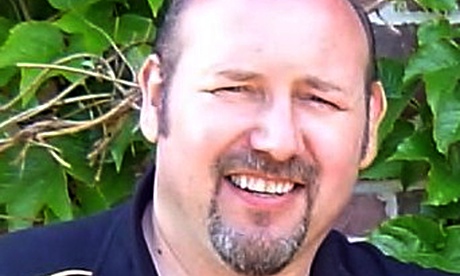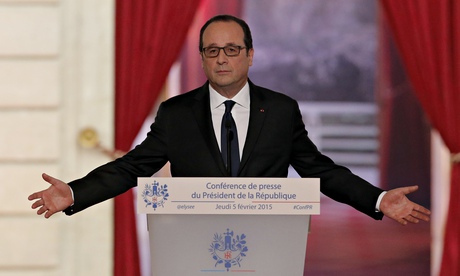Nadira Achab looked out across the curved concrete blocks of her estate of La Grande Borne in Grigny, south of Paris, and sighed. “People here just want to be treated like normal citizens, not second-class citizens,” she said. “It’s sad that we’re still not.”
La Grande Borne, built as an architectural utopia in the early 1970s, is now one of the most notorious council estates in France: a byword for hardship and inequality where about half of the 13,000 residents live below the poverty line, and one in two children leave school with no qualifications. It is not so much the drug dealers, the lack of services – even the post office closed a year ago after repeated break-ins – the isolation of being hemmed in by motorways or the feeling of abandonment by the state that irks Achab and her neighbours the most, but the “stigmatisation and discrimination” against people who live there.
When it emerged that Amédy Coulibaly, the man who killed a policewoman and four people in a kosher supermarket siege during January’s Charlie Hebdo attacks, had grown up here, a spotlight was shone once again on the crisis engulfing French suburban estates. Locals condemned Coulibaly outright, saying his radicalisation had happened in prison, not on the estate. But they fear it has triggered more prejudice against the place.
It is 10 years since France’s urban riots of 2005 promised to be the wake-up call that would force an end to the inequalities of ghetto high-rises in the suburban banlieues. That year, the death of two young boys hiding from police in an electricity substation in Clichy-sous-Bois outside Paris triggered weeks of unrest on estates. France declared a state of national emergency as more than 9,000 vehicles, dozens of public buildings and businesses were set on fire. It was the sign of the hopelessness of a generation of young people stuck in dismal suburbs, marginalised and jobless because of their address, skin colour or their parents’ immigrant origins.
Now, a decade on and despite years of emergency assistance plans, the banlieues remain in crisis. And the Socialist president, François Hollande, who came to power promising an end to the ghettos, is under increasing pressure to act. After the Charlie Hebdo and kosher supermarket attacks by French gunmen from poor backgrounds, the prime minister, Manuel Valls, made the most damning indictment yet of the country’s bitter social divide, saying there was “territorial, social and ethnic apartheid” in France.
When Hollande travelled to a northern Paris estate this week to mark the 10th anniversary of the riots and boost local entrepreneurs, claiming there were “no more forgotten neighbourhoods of the republic”, he was booed and asked by one youth: “When are things ever going to change here?” The housing estates voted overwhelmingly for Hollande but the sense that nothing has changed has alienated many and cast a shadow over his term in office.
Achab, 23, whose family has lived in La Grande Borne for three generations, was a child during the riots. “I was 13, I remember watching from the window, seeing buses burning, cars burning, everyone worried that their cars would be torched,” she said. “I remember the police, the climate of fear and not being allowed to go outside.”
Encouraged by her father, a truck driver, and mother, a childcare worker, the straight-A student is now at a top business school, bucking the trend for local kids being pushed by middle school to abandon academic choices in favour of professional training schemes for subjects such as manual labour or administration.
This year she co-founded Our Estate Has Talent, an association in which students who grew up on La Grande Borne go into local schools to inspire children about further study. “We’re trying to break the culture of failure,” she said. One of the banlieues’ biggest problems is education – France is ranked among the developed world’s most unequal school systems, with students’ performance dependent upon their socioeconomic status.
Achab’s grandparents were Algerian but since then, her family has been French. “I’m French, my parents are French, we’ve been French for two generations, yet I’m still constantly being asked: ‘Are you French?’” she said. “It’s unfair. There’s a feeling that nothing has really changed, that the unrest could happen again.”
More than 4.4 million people live in the toughest parts of the banlieues classed as priority zones, where, segregated along race and class lines, they face what Hollande has called “unbearable discrimination”. Grigny, a town of more than 27,000 people in Essonne, south of Paris, is at the sharp end. Three in five children live below the poverty line, unemployment – at 22% – is twice the national average, rising to more than 40% among young people. Almost 90% of the population live on two notorious estates: La Grande Borne, where a large refurbishment project is under way, and the high-rise “Grigny 2”, where private slum landlords have been taken to court for housing people in fetid conditions. Like in Clichy-sous-Bois, where the riots started, most feel that building renovation alone – though much needed – will not solve the problems of unemployment, education and the lack of a proper social mix on so-called ghetto estates.
“For the prime minister to say there’s social and territorial apartheid is an admission of failure,” said Grigny’s Communist mayor, Philippe Rio. For him, the repeated banlieue action plans were useful lifelines but not enough to undo years of an unofficial policy of segregation by the state. “We need more schools, more justice, better policing,” he said, adding that since the riots the housing estates had been badly hit by the financial crisis of 2008 and rising unemployment in France. His main hope was that today’s youth seemed less “nihilistic” than during the 2005 unrest. “People need dignity,” he said.
A festering problem in Grigny and across other estates is the mistrust between police and young people that was at the heart of the riots in 2005 and which has not been fixed. With no neighbourhood policing, it is often elite units who swoop. After a decade of legal battles by the families, police officers this year stood trial and were cleared of failing to help the boys, Zyed Benna and Bouna Traoré whose deaths sparked the 2005 riots.
One of Hollande’s manifesto promises was to begin registering France’s unmonitored police ID checks against non-white people, known as stop and frisk, which so often target black or north African young men just for walking down the street and were seen as gratuitous. But, to the fury of many voters in the banlieue, Hollande went back on that promise and such police checks continue unmonitored. This summer, in a landmark ruling, a French appeals court found that police carried out unjustified identity checks on five men from ethnic minorities and ordered the government to pay them damages. The state is to appeal.
“The biggest unresolved problem is the relationship between youth and police,” said Amar Henni, a leading youth worker in La Grande Borne. “The state took a security approach, rather than a social or education response. If you couple that with the ongoing lack of equal rights in school and employment, you find France just doesn’t have a project for a society where people live together. I think what has changed is that things have got worse, it hasn’t got better. I think there could be another 2005 but with much more violence. We’re in real crisis.”
Karim, 21, grew up in a council flat on the notorious Grigny 2 estate and remembers the riots, when he was 12, as just part of life on an estate. He ignored his school’s suggestion that he take a professional mechanic course, went to a top Paris university and is currently an intern at an investment bank. With Achab, he co-founded the association Our Estate Has Talent.
“There hasn’t been real reform here. It doesn’t feel like much has changed in 10 years. The number of people leaving school without qualifications is shocking: a system of inequality is repeating itself,” he said. He pointed to a study this month by the Institut Montaigne, which found a practising Muslim man was four times less likely to get a job interview in France than a Catholic, and Jews were also discriminated against. “The results reveal a strong discrimination against Muslims and Jews in France,” the study concluded.
In Grigny 2, Amel Amiri, 28, said she wanted to move for the sake of her children. “The cockroaches are the worst, scuttling around our flat. I spend €50 a month on spray but they keep coming back. But it’s the general atmosphere that I don’t want my six-year-old to grow up in.”
Claude Bohulu, 62, a handyman and political refugee from the Democratic Republic of the Congo, said: “No one feels there’s any future. That’s what has to change.”











